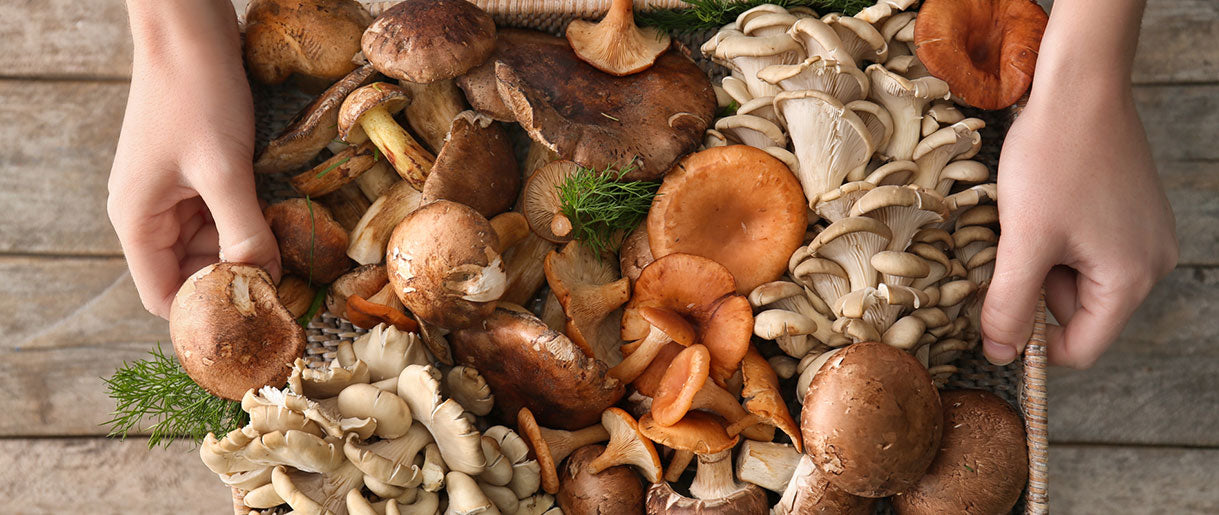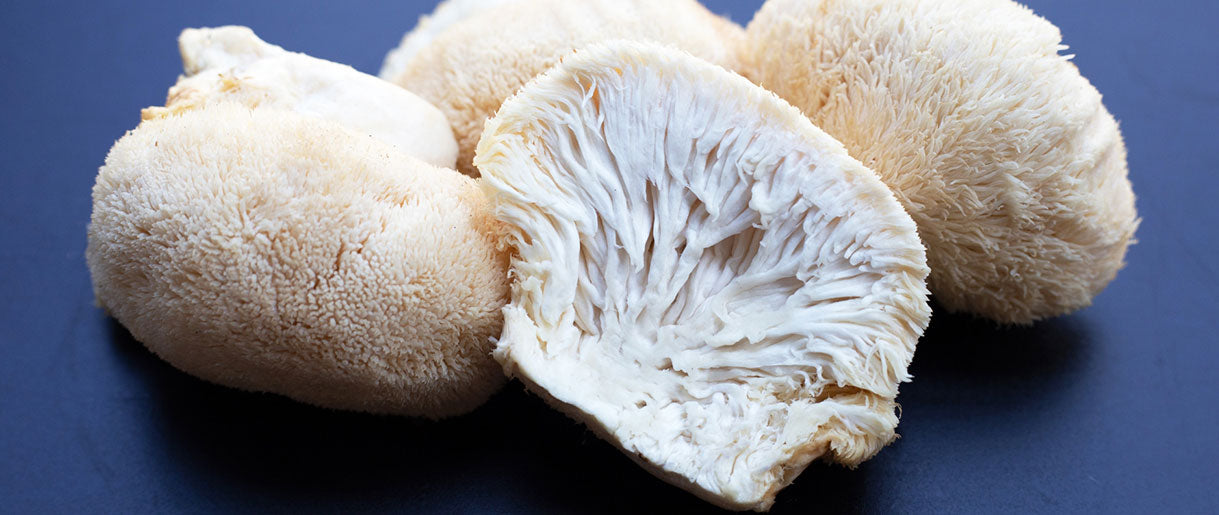Of late, the term "superfood" has been casually tossed throughout the wellness community. We seem to constantly be bombarded with advice on what to eat, how much to consume, and when—from chia to açai, spirulina to blueberries.
Many of these well-known and recognized "superfoods" are expensive, making many people believe they can't include them in their diets. But recently, a brand-new "superfood" that was completely unexpected was added to the list. You likely already have them in your refrigerator, which will save you money. Mushrooms.
Don’t believe us? Let us convince you how are mushrooms a superfood.
What Is A Superfood?

Superfoods are foods that provide your body with an additional nutritional boost. While superfood rankings appear to change yearly, mushrooms always make the cut. Superfoods all share a few features. They are typically made from plants and include whole grains, low-fat dairy, and seafood high in omega-3 fatty acids. In addition, all of the food items on the lists share the characteristics of being nutrient-dense and offering a variety of health benefits, such as anti-inflammatory or antibacterial components.
What Makes Mushrooms A Superfood?

Mushrooms are a fantastic source of potassium and vitamin D. B vitamins support the body in many ways, including converting food into energy sent to cells, regulating the neurological system, and maintaining the overall well-being of cells. In addition to promoting bone health, the vitamin D found in mushrooms controls the body's ability to produce the proteins required to fight viral and bacterial infections.
The antioxidants in mushrooms, such as glutathione and ergothioneine, may decrease the adverse effects of physiological stress-related aging. The benefits of mushrooms in reducing oxidative stress in the body are a vital component of a healthy anti-aging lifestyle. By consuming them, you can delay or decrease the effects of age-related disorders.
Although our bodies can't make selenium, it is an essential nutrient for the thyroid and metabolism. This antioxidant should be a part of your regular diet because it helps your body fight the effects of oxidative stress. In addition, selenium levels must be enough for the body to combat viral infections successfully.
The beneficial impact of mushrooms on aging-related cognitive deterioration is another bonus. According to a study from Singaporean researchers, seniors who consume two servings of mushrooms per week or more could reduce their risk of minor cognitive problems by half. Furthermore, it is believed that the antioxidants glutathione and ergothioneine may protect against Parkinson's and Alzheimer's.
Due to their anti-inflammatory qualities, mushrooms have been used as an additional component in treating breast cancer. So, as you can see, mushrooms benefit your general health and need to be consumed in several ways.
Mushroom Nutrition

When consumed or taken as supplements, mushrooms are known to be a source of unique carbohydrates and antioxidants that perform specific functions. These are also good sources of protein, copper, vitamins B2, B3, and B5, and selenium. Additionally, they are a good source of zinc, a mineral essential to the body's over 100 enzyme systems.
Glucans and hetero-glucans are carbohydrates found in mushrooms and have anti-inflammatory and immune-boosting properties. Like several over-the-counter painkillers, these complex carbs can work as COX-2 inhibitors without the associated adverse effects. Additionally, it has been demonstrated that they enhance macrophage activation, enhancing the immune system's response to invasive infections.
Benefits Of Super Mushrooms

You can enjoy beneficial health benefits from mushrooms beyond essential nourishment. They contain beta-glucans, for instance, dietary fibers (polysaccharides) linked to lowering cholesterol, promoting heart health, and boosting your immune system.
Several antioxidants, including L-ergothioneine, vitamin C, vitamin A, and beta-carotene, are also present in many mushrooms, including Reishi and Maitake. These can help reverse the harmful health effects of free radicals and unstable atoms that can harm cells, result in diseases, and accelerate aging.
Other mushrooms, such as Reishi, Cordyceps, and Lion's mane, are highly adaptogenic. This means that regulating hormones and stabilizing the central nervous system help the body and mind cope with stress and battle exhaustion.
The scientific community is working to develop more and more natural alternatives to medication, and research into potential superfoods is growing year after year. These foods are referred to as the "medicines of the future." In light of this, research into mushrooms and their potential as superfoods is similar.
A study published in the International Journal of Medicinal Mushrooms(1) found that different mushrooms have additional antioxidant capabilities, with Lion's mane mushrooms being an excellent source.
Additional research has revealed that eating mushrooms may enhance gut flora, support the gastrointestinal system, reduce inflammation, and even improve mood. Eating mushrooms may also help prevent respiratory infections.
Which Mushrooms Superfood Has The Most Benefits?

Although all mushrooms are fantastic in some manner (often several!), some of them have perks that may help you accomplish specific goals. Three of the best "life optimizing" mushrooms for you are featured here, which can help you:
- Sleep better.
- Reduce sick days.
- Stress less.
- Recover faster following exercise.
Reishi mushrooms to unwind and sleep like a baby.
Reishi, known in traditional medicine as the "mushroom of immortality," is one of the most well-liked whole-food functional mushrooms due to its many positive health effects. Mighty, natural beta-glucans found in reishi support the immune system's functioning.
The mushroom, widely regarded as an excellent adaptogen, works with your body to manage common physical, mental, and emotional stressors and restore equilibrium healthily and naturally. Reishi is also linked to improved blood sugar control(2), increased immunity, and decreased inflammation.
Chaga mushrooms as a supercharger.
Traditional healers in North America, Europe, and Asia have used Chaga, often known as the "King of Medicinal Mushrooms," extensively. With its capacity to reduce inflammation, modulate immunological responses, and support systemic balance, Chaga is essentially an "anti-everything-bad" mushroom. Additionally, Chaga is a fantastic beauty supplement that promotes the health of hair, skin, and nails from the inside out.
Cordyceps, a gym enthusiast's dream mushroom
The body benefits from Cordyceps mushrooms(3) by improving oxygen flow while boosting the production of ATP, the body's "currency" of energy, for a more effective immune response against pathogens.
The "super" status of mushrooms is still supported by promising new studies. However, more human clinical trials are required to explore these little powerhouses' potential fully. Still, until then, you can benefit from the recognized benefits of using mushrooms as a superfood to fuel your daily activities.
FAQs About Are Mushrooms A Superfood?
Can Mushrooms Improve Cognitive Function And Brain Health?
According to research, greater mushroom consumption has been linked to higher scores on some cognitive function tests. This implies that regular ingestion of mushrooms may lower the risk of mental deterioration.
How To Incorporate Mushrooms Into My Diet?
You can include culinary mushrooms such as portobellos in Italian food or Shiitake and oyster in Asian cuisines. In addition, consider supplements, tinctures, or superfood mushroom powders for a concentrated dose of "mushroomy goodness." These more potent choices provide increased nutrient bioavailability to help your body absorb more substances that support good health.
What Are Some Easy And Tasty Recipes That Feature Mushrooms As A Superfood?
More than a meat substitute, mushrooms are the main ingredient in many famous evening dinners, such as hearty soups, savory sandwiches, and vegetarian pasta dishes. Some mushroom recipes include stuffed mushrooms, creamy mushroom soup, mushroom toast, creamy pasta with mushrooms, and mushroom galauti kebabs.
Key Takeaways
Are mushrooms a superfood? Absolutely! When considering superfoods, mushrooms might not be the first thing that comes to mind because, let's face it, they look pretty strange and are beige. These miraculous fungal caps may not have the aesthetic appeal and color of other nutrient-rich food. Still, they contain a wealth of excellent health benefits, such as antioxidant, antibacterial, and immune-stimulating characteristics, which can help your body and mind immensely.
References
- Mycochemical Profiling and Antioxidant Activity of Two Different Tea Preparations from Lion's Mane Medicinal Mushroom, Hericium erinaceus (Agaricomycetes), (1)https://pubmed.ncbi.nlm.nih.gov/34936309/
- Mushrooms of the Genus Ganoderma Used to Treat Diabetes and Insulin Resistance, (2)https://www.ncbi.nlm.nih.gov/pmc/articles/PMC6891282/
- Chapter 5, Cordyceps as an Herbal Drug, (3)https://www.ncbi.nlm.nih.gov/books/NBK92758/








Let Us Know Your Comments